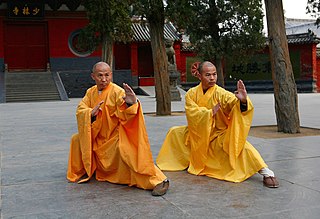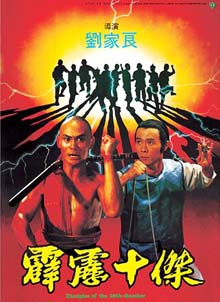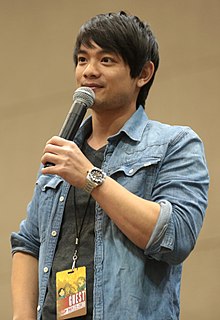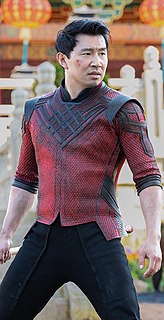
Hung Ga (洪家), Hung Kuen (洪拳), or Hung Ga Kuen (洪家拳) is a southern Chinese martial art belonging to the southern Shaolin styles. The Hallmarks of Hung Ga are strong stances, notably the horse stance or "si ping ma" (四平馬), and strong hand techniques, notably the bridge hand and the versatile tiger claw. Traditionally, students spent anywhere from several months to three years in stance training, often sitting only in horse stance from half an hour to several hours at a time, before learning any forms. Each form could then take a year or so to learn, with weapons learned last. In current times, this mode of instruction is generally considered impractical for students, who have other concerns beyond practicing kung fu. However, some instructors still follow traditional guidelines and make stance training the majority of their beginner training. Hung Ga is sometimes mis-characterized as solely external—that is, reliant on brute physical force rather than the cultivation of qi—even though the student advances progressively towards an internal focus.
Kung Fu is an American action-adventure martial arts Western drama television series starring David Carradine. The series follows the adventures of Kwai Chang Caine, a Shaolin monk who travels through the American Old West, armed only with his spiritual training and his skill in martial arts, as he seeks Danny Caine, his half-brother.
Wire fu is an element or style of Hong Kong action cinema used in fight scenes. It is a combination of two terms: "wire work" and "kung fu".

Kung Fu Hustle is a 2004 action-comedy film directed, produced, co-written by, and starring Stephen Chow. The film tells the story of a murderous neighbourhood gang, a poor village with unlikely heroes, and an aspiring gangster's fierce journey to find his true self. Eva Huang, Yuen Wah, Yuen Qiu, Danny Chan Kwok-kwan and Leung Siu-lung co-starred in prominent roles. The martial arts choreography is supervised by Yuen Woo-ping.
Hong Kong action cinema is the principal source of the Hong Kong film industry's global fame. Action films from Hong Kong have roots in Chinese and Hong Kong cultures including Chinese opera, storytelling and aesthetic traditions, which Hong Kong filmmakers combined with elements from Hollywood and Japanese cinema along with new action choreography and filmmaking techniques, to create a culturally distinctive form that went on to have wide transcultural appeal. In turn, Hollywood action films have been heavily influenced by Hong Kong genre conventions, from the 1970s onwards.

Disciples Of The 36th Chamber is a 1985 Shaw Brothers Studio Hong Kong martial arts film comedy written, directed and choreographed Lau Kar-leung. It is the third in a loose trilogy of films that began with The 36th Chamber of Shaolin (1978) and was followed by Return to the 36th Chamber (1980). In Disciples, the action is focused on Hsiao Ho, who portrays legendary martial artist Fong Sai-Yuk. Gordon Liu, a constant in the 36th Chamber series, reprises his role from The 36th Chamber of Shaolin as the monk San Te.

Jimmy Wang Yu was a Taiwanese actor, film director, producer, and screenwriter. Wang rose to fame in 1967 with his starring role in One-Armed Swordsman, a martial arts film produced by the Shaw Brothers Studio, and The Chinese Boxer (1970).
Shek Wing-cheung, better known by his stage name Shih Kien, Sek Kin, or Sek Gin, was a Hong Kong–based Chinese actor. Shih is best known for playing antagonists and villains in several early Hong Kong wuxia and martial arts films that dated back to the black-and-white period, and is most familiar to Western audiences for his portrayal of the primary villain, Han, in the 1973 martial arts film Enter the Dragon, which starred Bruce Lee.
Tiger & Crane Fists is a 1976 kung fu movie, starring 70s Hong Kong star Jimmy Wang Yu.
Kung fu film is a subgenre of martial arts films and Hong Kong action cinema set in the contemporary period and featuring realistic martial arts. It lacks the fantasy elements seen in wuxia, a related martial arts genre that uses historical settings based on ancient China. Swordplay is also less common in kung-fu films than in wuxia and fighting is done through unarmed combat.

Fong Sai-yuk is a 1993 Hong Kong action-comedy film directed by Corey Yuen and produced by Jet Li, who stars as Chinese folk hero Fong Sai-yuk. The film won the Hong Kong Film Award and Golden Horse Award for best action choreography. The film received positive reviews, particularly praising Josephine Siao's acting and the action choreography. The film had a sequel, Fong Sai-yuk II, released later the same year in 1993.

Shaolin Temple a.k.a. Death Chambers is a Shaw Brothers film directed by Chang Cheh. It is one of the Shaolin Temple themed martial arts films and concerns their rebellion against the Qings, with an all-star cast featuring the second and third generations of Chang Cheh's stable of actors including David Chiang, Ti Lung, Alexander Fu Sheng and Chi Kuan-Chun, as well as cameo appearances by several of the actors that would later become collectively known as the Venoms mob. The film serves as a pseudo prequel to Five Shaolin Masters.

Flower Drum Song is a 1961 American musical film directed by Henry Koster, adapted from the 1958 Broadway musical Flower Drum Song, written by the composer Richard Rodgers and the lyricist/librettist Oscar Hammerstein II, in turn based on the 1957 novel of the same name by the Chinese American author Chin Yang Lee. The film stars Nancy Kwan, James Shigeta, Miyoshi Umeki, Jack Soo, Benson Fong and Juanita Hall. It was nominated for five Academy Awards and two Golden Globe Awards, including Best Motion Picture – Musical or Comedy.
Michael Chow Man-Kin is a Beijing-born Hong Kong-based actor.

Choy Lee Fut is a Chinese martial art and wushu style, founded in 1836 by Chan Heung (陳享). Choy Li Fut was named to honor the Buddhist monk Choy Fook who taught him Choy Gar, and Li Yau-San (李友山) who taught him Li Gar, plus his uncle Chan Yuen-Wu (陳遠護), who taught him Hung Kuen, and developed to honor the Buddha and the Shaolin roots of the system.

Doc-Fai Wong (黄德輝) is recognized internationally as a master of the Hung Sing branch of Choy Li Fut kung fu and T'ai chi ch'uan. He was born in 1948 in the Guangdong (广东) province of China; the Wangshan village of Wushan - Doumen district of Zhuhai City. In April 1960, he immigrated to San Francisco, California with his mother to be reunited with his father. He arrived as a third-generation citizen of the United States of America since both his grandfather and father were already citizens. He sought out his first kung fu teacher - Lau Bun (劉彬), the founder of the first Hung Sing Kwoon of Choy Li Fut in America, after encountering taunting and bullying due to language and ethnic difficulties after his arrival. When Lau Bun died in 1967, he started teaching and opened his first school when he was 19 years old.

Osric Chau is a Canadian actor, best known for his role as Kevin Tran in the CW series Supernatural, Vogel in the BBC America series Dirk Gently's Holistic Detective Agency, and Ryan Choi in the TV shows set in the Arrowverse.

Just Another Pandora's Box, also known as Once Upon a Chinese Classic, is a 2010 Hong Kong parody film directed by Jeffrey Lau, starring Ronald Cheng, Gigi Leung, Betty Sun, Eric Tsang, Huang Bo, Guo Degang, Gillian Chung, and Patrick Tam. It is a spiritual successor to Lau's two-part 1995 film A Chinese Odyssey. Athena Chu, who starred in A Chinese Odyssey, makes a guest appearance in Just Another Pandora's Box.

Xu Shang-Chi is a fictional character portrayed by Simu Liu in the Marvel Cinematic Universe (MCU) multimedia franchise, based on the Marvel Comics character of the same name. In the franchise, Shang-Chi is the son of Ying Li and Wenwu, the founder and first leader of the Ten Rings terrorist organization. Trained to be a highly skilled martial artist and assassin by his father, alongside his sister Xialing, Shang-Chi left the Ten Rings for a normal life in San Francisco, only to be drawn back into the world he left behind when Wenwu seeks him out.











